Power and Domination: Sociological Theories and Enlightenment
VerifiedAdded on 2022/12/29
|9
|2337
|49
Essay
AI Summary
This essay provides a comprehensive overview of the sociological concepts of power and domination, focusing on the contrasting perspectives of Karl Marx and Max Weber. It begins by examining the concept of oppression in contemporary society, setting the stage for a deeper analysis of how Marx and Weber defined power and domination. Marx's perspective emphasizes the role of class and production in shaping power dynamics, while Weber focuses on the individual's ability to exert their will and the role of authority and status. The essay then compares their views on social change, highlighting Marx's emphasis on class conflict and Weber's focus on social actions. Finally, the essay explores their understanding of the Enlightenment paradigm, discussing how Marx linked it to materialism and Weber to disenchantment. The essay concludes by providing a comparative analysis of these theories, offering valuable insights into the complexities of power, domination, and societal transformation. The essay is available on Desklib, a platform providing AI-based study tools for students.
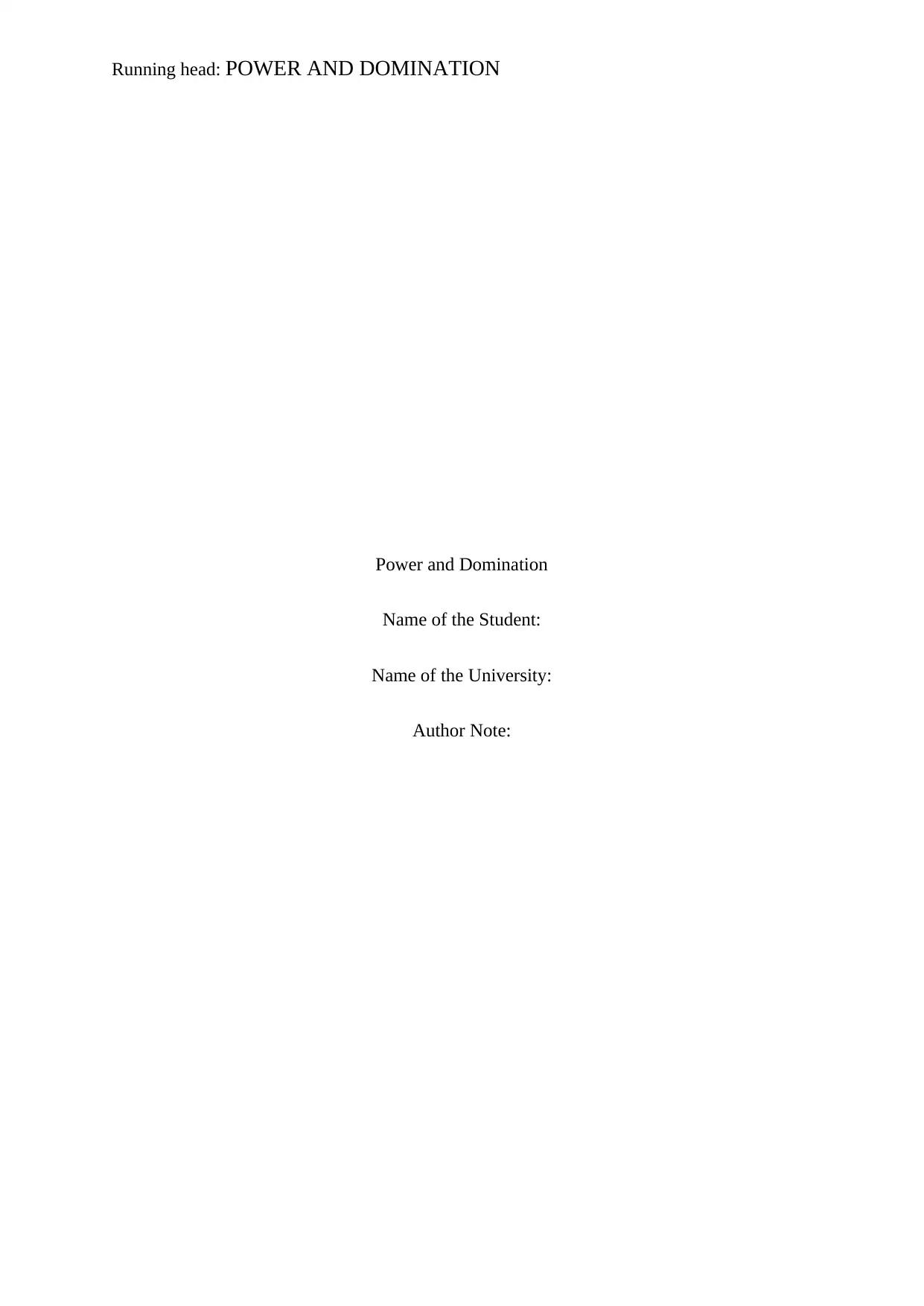
Running head: POWER AND DOMINATION
Power and Domination
Name of the Student:
Name of the University:
Author Note:
Power and Domination
Name of the Student:
Name of the University:
Author Note:
Paraphrase This Document
Need a fresh take? Get an instant paraphrase of this document with our AI Paraphraser
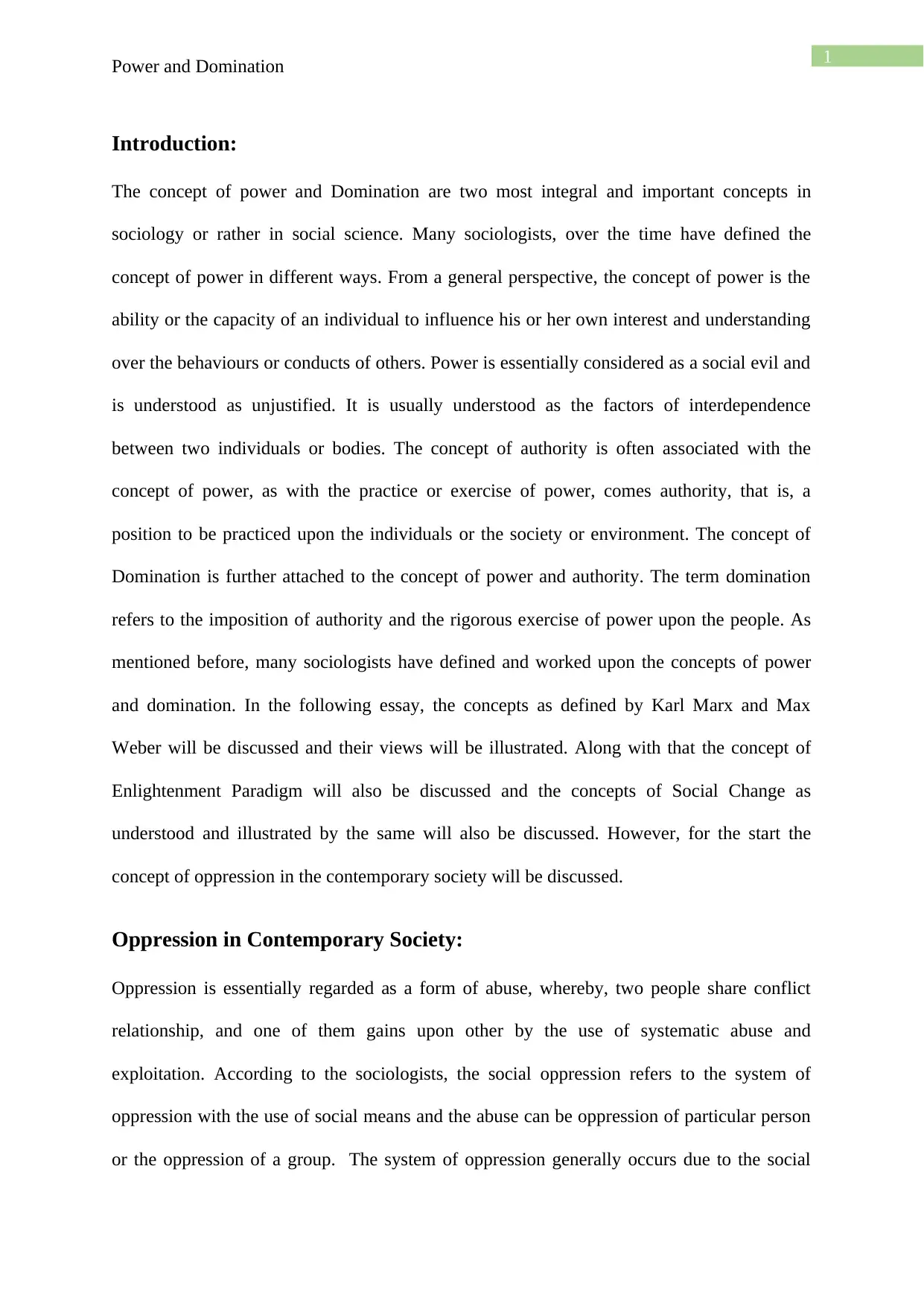
1
Power and Domination
Introduction:
The concept of power and Domination are two most integral and important concepts in
sociology or rather in social science. Many sociologists, over the time have defined the
concept of power in different ways. From a general perspective, the concept of power is the
ability or the capacity of an individual to influence his or her own interest and understanding
over the behaviours or conducts of others. Power is essentially considered as a social evil and
is understood as unjustified. It is usually understood as the factors of interdependence
between two individuals or bodies. The concept of authority is often associated with the
concept of power, as with the practice or exercise of power, comes authority, that is, a
position to be practiced upon the individuals or the society or environment. The concept of
Domination is further attached to the concept of power and authority. The term domination
refers to the imposition of authority and the rigorous exercise of power upon the people. As
mentioned before, many sociologists have defined and worked upon the concepts of power
and domination. In the following essay, the concepts as defined by Karl Marx and Max
Weber will be discussed and their views will be illustrated. Along with that the concept of
Enlightenment Paradigm will also be discussed and the concepts of Social Change as
understood and illustrated by the same will also be discussed. However, for the start the
concept of oppression in the contemporary society will be discussed.
Oppression in Contemporary Society:
Oppression is essentially regarded as a form of abuse, whereby, two people share conflict
relationship, and one of them gains upon other by the use of systematic abuse and
exploitation. According to the sociologists, the social oppression refers to the system of
oppression with the use of social means and the abuse can be oppression of particular person
or the oppression of a group. The system of oppression generally occurs due to the social
Power and Domination
Introduction:
The concept of power and Domination are two most integral and important concepts in
sociology or rather in social science. Many sociologists, over the time have defined the
concept of power in different ways. From a general perspective, the concept of power is the
ability or the capacity of an individual to influence his or her own interest and understanding
over the behaviours or conducts of others. Power is essentially considered as a social evil and
is understood as unjustified. It is usually understood as the factors of interdependence
between two individuals or bodies. The concept of authority is often associated with the
concept of power, as with the practice or exercise of power, comes authority, that is, a
position to be practiced upon the individuals or the society or environment. The concept of
Domination is further attached to the concept of power and authority. The term domination
refers to the imposition of authority and the rigorous exercise of power upon the people. As
mentioned before, many sociologists have defined and worked upon the concepts of power
and domination. In the following essay, the concepts as defined by Karl Marx and Max
Weber will be discussed and their views will be illustrated. Along with that the concept of
Enlightenment Paradigm will also be discussed and the concepts of Social Change as
understood and illustrated by the same will also be discussed. However, for the start the
concept of oppression in the contemporary society will be discussed.
Oppression in Contemporary Society:
Oppression is essentially regarded as a form of abuse, whereby, two people share conflict
relationship, and one of them gains upon other by the use of systematic abuse and
exploitation. According to the sociologists, the social oppression refers to the system of
oppression with the use of social means and the abuse can be oppression of particular person
or the oppression of a group. The system of oppression generally occurs due to the social
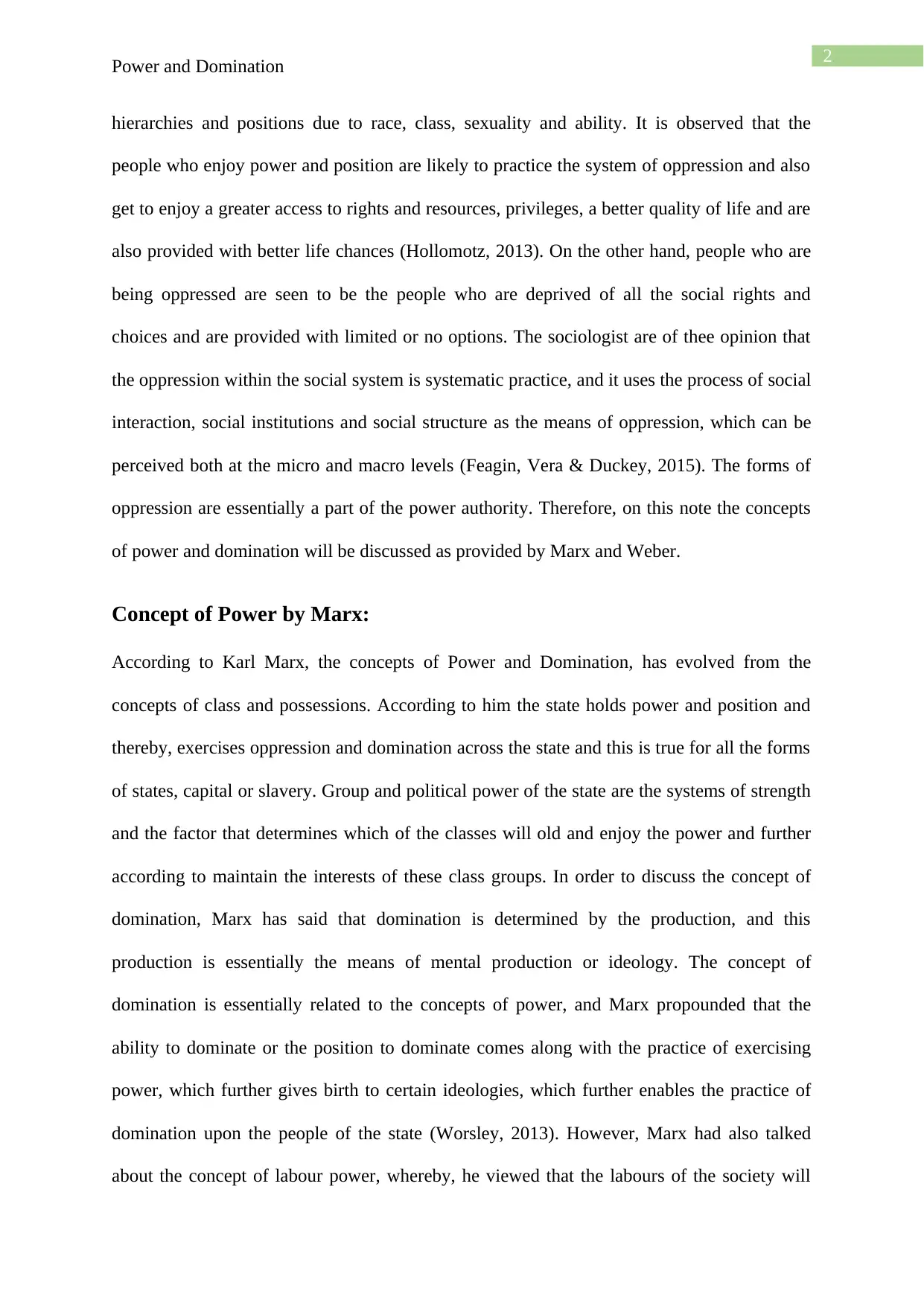
2
Power and Domination
hierarchies and positions due to race, class, sexuality and ability. It is observed that the
people who enjoy power and position are likely to practice the system of oppression and also
get to enjoy a greater access to rights and resources, privileges, a better quality of life and are
also provided with better life chances (Hollomotz, 2013). On the other hand, people who are
being oppressed are seen to be the people who are deprived of all the social rights and
choices and are provided with limited or no options. The sociologist are of thee opinion that
the oppression within the social system is systematic practice, and it uses the process of social
interaction, social institutions and social structure as the means of oppression, which can be
perceived both at the micro and macro levels (Feagin, Vera & Duckey, 2015). The forms of
oppression are essentially a part of the power authority. Therefore, on this note the concepts
of power and domination will be discussed as provided by Marx and Weber.
Concept of Power by Marx:
According to Karl Marx, the concepts of Power and Domination, has evolved from the
concepts of class and possessions. According to him the state holds power and position and
thereby, exercises oppression and domination across the state and this is true for all the forms
of states, capital or slavery. Group and political power of the state are the systems of strength
and the factor that determines which of the classes will old and enjoy the power and further
according to maintain the interests of these class groups. In order to discuss the concept of
domination, Marx has said that domination is determined by the production, and this
production is essentially the means of mental production or ideology. The concept of
domination is essentially related to the concepts of power, and Marx propounded that the
ability to dominate or the position to dominate comes along with the practice of exercising
power, which further gives birth to certain ideologies, which further enables the practice of
domination upon the people of the state (Worsley, 2013). However, Marx had also talked
about the concept of labour power, whereby, he viewed that the labours of the society will
Power and Domination
hierarchies and positions due to race, class, sexuality and ability. It is observed that the
people who enjoy power and position are likely to practice the system of oppression and also
get to enjoy a greater access to rights and resources, privileges, a better quality of life and are
also provided with better life chances (Hollomotz, 2013). On the other hand, people who are
being oppressed are seen to be the people who are deprived of all the social rights and
choices and are provided with limited or no options. The sociologist are of thee opinion that
the oppression within the social system is systematic practice, and it uses the process of social
interaction, social institutions and social structure as the means of oppression, which can be
perceived both at the micro and macro levels (Feagin, Vera & Duckey, 2015). The forms of
oppression are essentially a part of the power authority. Therefore, on this note the concepts
of power and domination will be discussed as provided by Marx and Weber.
Concept of Power by Marx:
According to Karl Marx, the concepts of Power and Domination, has evolved from the
concepts of class and possessions. According to him the state holds power and position and
thereby, exercises oppression and domination across the state and this is true for all the forms
of states, capital or slavery. Group and political power of the state are the systems of strength
and the factor that determines which of the classes will old and enjoy the power and further
according to maintain the interests of these class groups. In order to discuss the concept of
domination, Marx has said that domination is determined by the production, and this
production is essentially the means of mental production or ideology. The concept of
domination is essentially related to the concepts of power, and Marx propounded that the
ability to dominate or the position to dominate comes along with the practice of exercising
power, which further gives birth to certain ideologies, which further enables the practice of
domination upon the people of the state (Worsley, 2013). However, Marx had also talked
about the concept of labour power, whereby, he viewed that the labours of the society will
⊘ This is a preview!⊘
Do you want full access?
Subscribe today to unlock all pages.

Trusted by 1+ million students worldwide
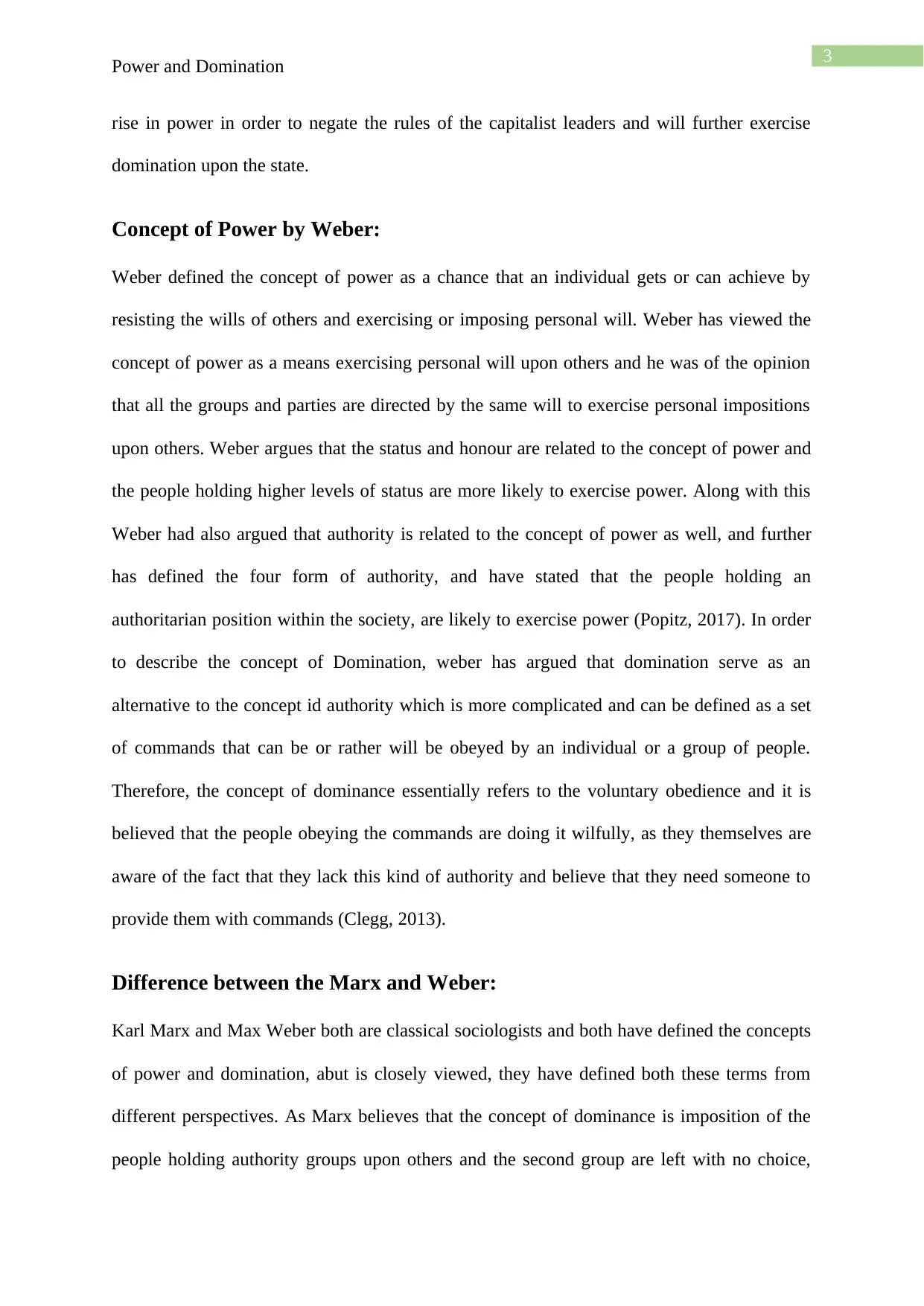
3
Power and Domination
rise in power in order to negate the rules of the capitalist leaders and will further exercise
domination upon the state.
Concept of Power by Weber:
Weber defined the concept of power as a chance that an individual gets or can achieve by
resisting the wills of others and exercising or imposing personal will. Weber has viewed the
concept of power as a means exercising personal will upon others and he was of the opinion
that all the groups and parties are directed by the same will to exercise personal impositions
upon others. Weber argues that the status and honour are related to the concept of power and
the people holding higher levels of status are more likely to exercise power. Along with this
Weber had also argued that authority is related to the concept of power as well, and further
has defined the four form of authority, and have stated that the people holding an
authoritarian position within the society, are likely to exercise power (Popitz, 2017). In order
to describe the concept of Domination, weber has argued that domination serve as an
alternative to the concept id authority which is more complicated and can be defined as a set
of commands that can be or rather will be obeyed by an individual or a group of people.
Therefore, the concept of dominance essentially refers to the voluntary obedience and it is
believed that the people obeying the commands are doing it wilfully, as they themselves are
aware of the fact that they lack this kind of authority and believe that they need someone to
provide them with commands (Clegg, 2013).
Difference between the Marx and Weber:
Karl Marx and Max Weber both are classical sociologists and both have defined the concepts
of power and domination, abut is closely viewed, they have defined both these terms from
different perspectives. As Marx believes that the concept of dominance is imposition of the
people holding authority groups upon others and the second group are left with no choice,
Power and Domination
rise in power in order to negate the rules of the capitalist leaders and will further exercise
domination upon the state.
Concept of Power by Weber:
Weber defined the concept of power as a chance that an individual gets or can achieve by
resisting the wills of others and exercising or imposing personal will. Weber has viewed the
concept of power as a means exercising personal will upon others and he was of the opinion
that all the groups and parties are directed by the same will to exercise personal impositions
upon others. Weber argues that the status and honour are related to the concept of power and
the people holding higher levels of status are more likely to exercise power. Along with this
Weber had also argued that authority is related to the concept of power as well, and further
has defined the four form of authority, and have stated that the people holding an
authoritarian position within the society, are likely to exercise power (Popitz, 2017). In order
to describe the concept of Domination, weber has argued that domination serve as an
alternative to the concept id authority which is more complicated and can be defined as a set
of commands that can be or rather will be obeyed by an individual or a group of people.
Therefore, the concept of dominance essentially refers to the voluntary obedience and it is
believed that the people obeying the commands are doing it wilfully, as they themselves are
aware of the fact that they lack this kind of authority and believe that they need someone to
provide them with commands (Clegg, 2013).
Difference between the Marx and Weber:
Karl Marx and Max Weber both are classical sociologists and both have defined the concepts
of power and domination, abut is closely viewed, they have defined both these terms from
different perspectives. As Marx believes that the concept of dominance is imposition of the
people holding authority groups upon others and the second group are left with no choice,
Paraphrase This Document
Need a fresh take? Get an instant paraphrase of this document with our AI Paraphraser
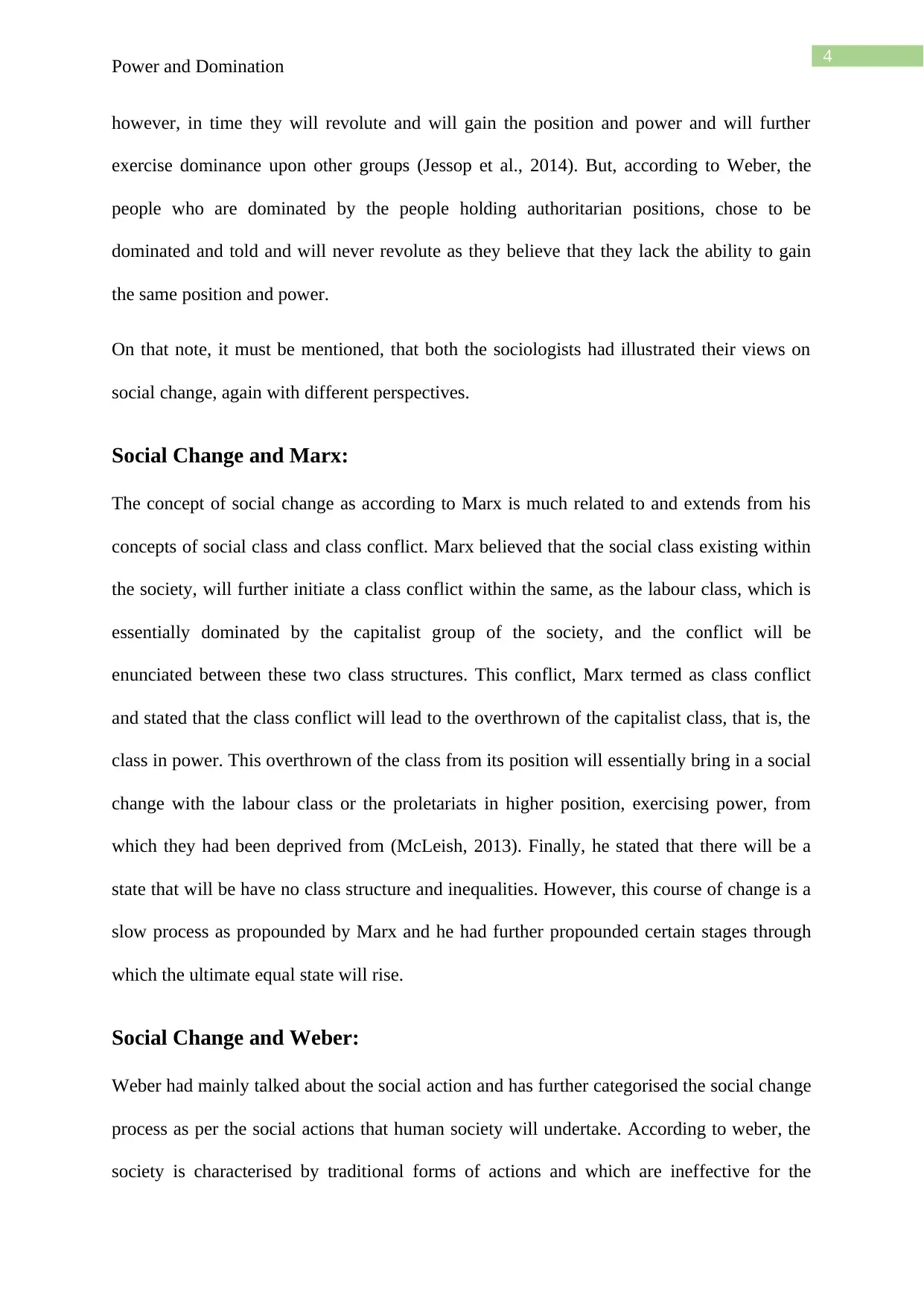
4
Power and Domination
however, in time they will revolute and will gain the position and power and will further
exercise dominance upon other groups (Jessop et al., 2014). But, according to Weber, the
people who are dominated by the people holding authoritarian positions, chose to be
dominated and told and will never revolute as they believe that they lack the ability to gain
the same position and power.
On that note, it must be mentioned, that both the sociologists had illustrated their views on
social change, again with different perspectives.
Social Change and Marx:
The concept of social change as according to Marx is much related to and extends from his
concepts of social class and class conflict. Marx believed that the social class existing within
the society, will further initiate a class conflict within the same, as the labour class, which is
essentially dominated by the capitalist group of the society, and the conflict will be
enunciated between these two class structures. This conflict, Marx termed as class conflict
and stated that the class conflict will lead to the overthrown of the capitalist class, that is, the
class in power. This overthrown of the class from its position will essentially bring in a social
change with the labour class or the proletariats in higher position, exercising power, from
which they had been deprived from (McLeish, 2013). Finally, he stated that there will be a
state that will be have no class structure and inequalities. However, this course of change is a
slow process as propounded by Marx and he had further propounded certain stages through
which the ultimate equal state will rise.
Social Change and Weber:
Weber had mainly talked about the social action and has further categorised the social change
process as per the social actions that human society will undertake. According to weber, the
society is characterised by traditional forms of actions and which are ineffective for the
Power and Domination
however, in time they will revolute and will gain the position and power and will further
exercise dominance upon other groups (Jessop et al., 2014). But, according to Weber, the
people who are dominated by the people holding authoritarian positions, chose to be
dominated and told and will never revolute as they believe that they lack the ability to gain
the same position and power.
On that note, it must be mentioned, that both the sociologists had illustrated their views on
social change, again with different perspectives.
Social Change and Marx:
The concept of social change as according to Marx is much related to and extends from his
concepts of social class and class conflict. Marx believed that the social class existing within
the society, will further initiate a class conflict within the same, as the labour class, which is
essentially dominated by the capitalist group of the society, and the conflict will be
enunciated between these two class structures. This conflict, Marx termed as class conflict
and stated that the class conflict will lead to the overthrown of the capitalist class, that is, the
class in power. This overthrown of the class from its position will essentially bring in a social
change with the labour class or the proletariats in higher position, exercising power, from
which they had been deprived from (McLeish, 2013). Finally, he stated that there will be a
state that will be have no class structure and inequalities. However, this course of change is a
slow process as propounded by Marx and he had further propounded certain stages through
which the ultimate equal state will rise.
Social Change and Weber:
Weber had mainly talked about the social action and has further categorised the social change
process as per the social actions that human society will undertake. According to weber, the
society is characterised by traditional forms of actions and which are ineffective for the
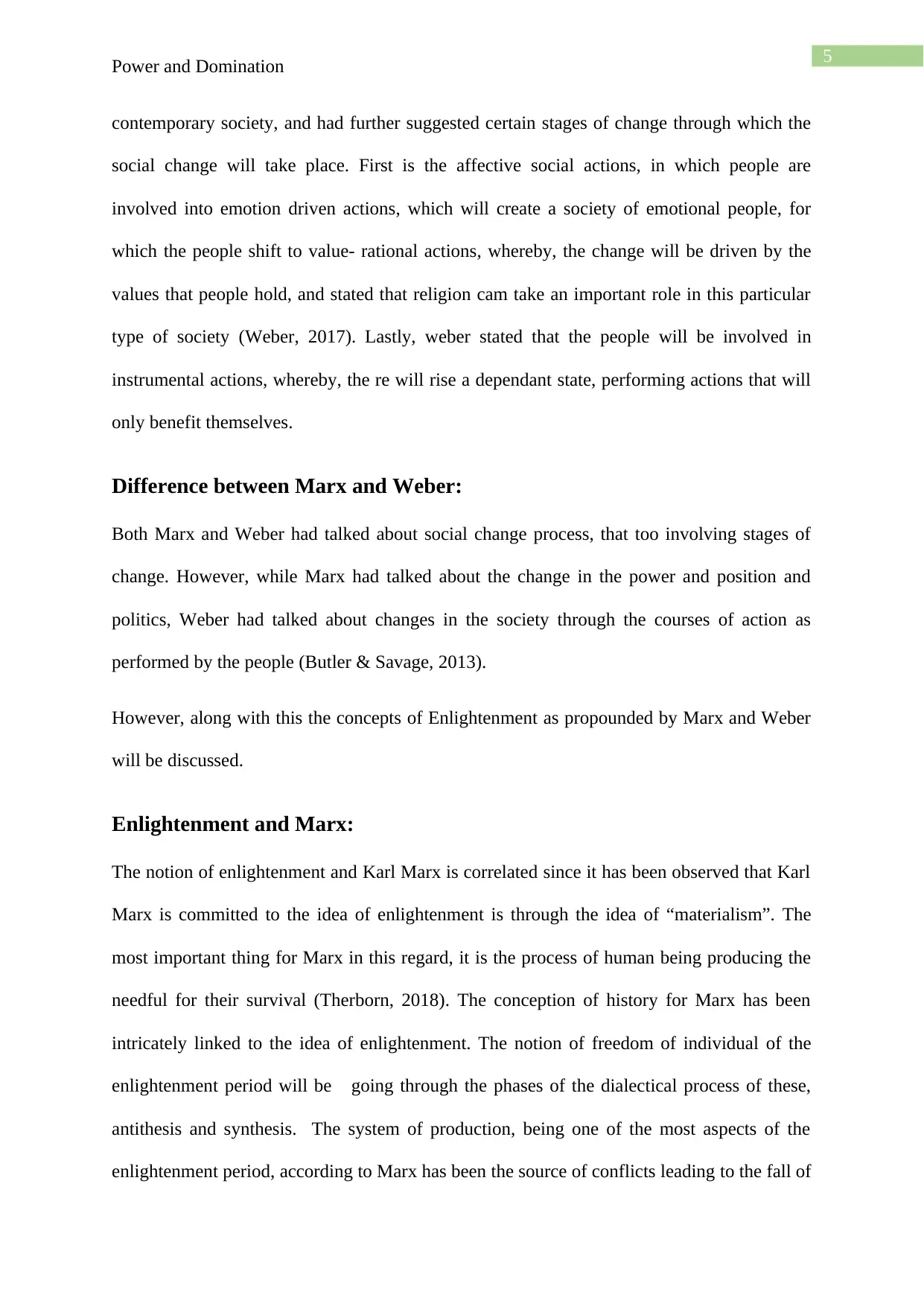
5
Power and Domination
contemporary society, and had further suggested certain stages of change through which the
social change will take place. First is the affective social actions, in which people are
involved into emotion driven actions, which will create a society of emotional people, for
which the people shift to value- rational actions, whereby, the change will be driven by the
values that people hold, and stated that religion cam take an important role in this particular
type of society (Weber, 2017). Lastly, weber stated that the people will be involved in
instrumental actions, whereby, the re will rise a dependant state, performing actions that will
only benefit themselves.
Difference between Marx and Weber:
Both Marx and Weber had talked about social change process, that too involving stages of
change. However, while Marx had talked about the change in the power and position and
politics, Weber had talked about changes in the society through the courses of action as
performed by the people (Butler & Savage, 2013).
However, along with this the concepts of Enlightenment as propounded by Marx and Weber
will be discussed.
Enlightenment and Marx:
The notion of enlightenment and Karl Marx is correlated since it has been observed that Karl
Marx is committed to the idea of enlightenment is through the idea of “materialism”. The
most important thing for Marx in this regard, it is the process of human being producing the
needful for their survival (Therborn, 2018). The conception of history for Marx has been
intricately linked to the idea of enlightenment. The notion of freedom of individual of the
enlightenment period will be going through the phases of the dialectical process of these,
antithesis and synthesis. The system of production, being one of the most aspects of the
enlightenment period, according to Marx has been the source of conflicts leading to the fall of
Power and Domination
contemporary society, and had further suggested certain stages of change through which the
social change will take place. First is the affective social actions, in which people are
involved into emotion driven actions, which will create a society of emotional people, for
which the people shift to value- rational actions, whereby, the change will be driven by the
values that people hold, and stated that religion cam take an important role in this particular
type of society (Weber, 2017). Lastly, weber stated that the people will be involved in
instrumental actions, whereby, the re will rise a dependant state, performing actions that will
only benefit themselves.
Difference between Marx and Weber:
Both Marx and Weber had talked about social change process, that too involving stages of
change. However, while Marx had talked about the change in the power and position and
politics, Weber had talked about changes in the society through the courses of action as
performed by the people (Butler & Savage, 2013).
However, along with this the concepts of Enlightenment as propounded by Marx and Weber
will be discussed.
Enlightenment and Marx:
The notion of enlightenment and Karl Marx is correlated since it has been observed that Karl
Marx is committed to the idea of enlightenment is through the idea of “materialism”. The
most important thing for Marx in this regard, it is the process of human being producing the
needful for their survival (Therborn, 2018). The conception of history for Marx has been
intricately linked to the idea of enlightenment. The notion of freedom of individual of the
enlightenment period will be going through the phases of the dialectical process of these,
antithesis and synthesis. The system of production, being one of the most aspects of the
enlightenment period, according to Marx has been the source of conflicts leading to the fall of
⊘ This is a preview!⊘
Do you want full access?
Subscribe today to unlock all pages.

Trusted by 1+ million students worldwide
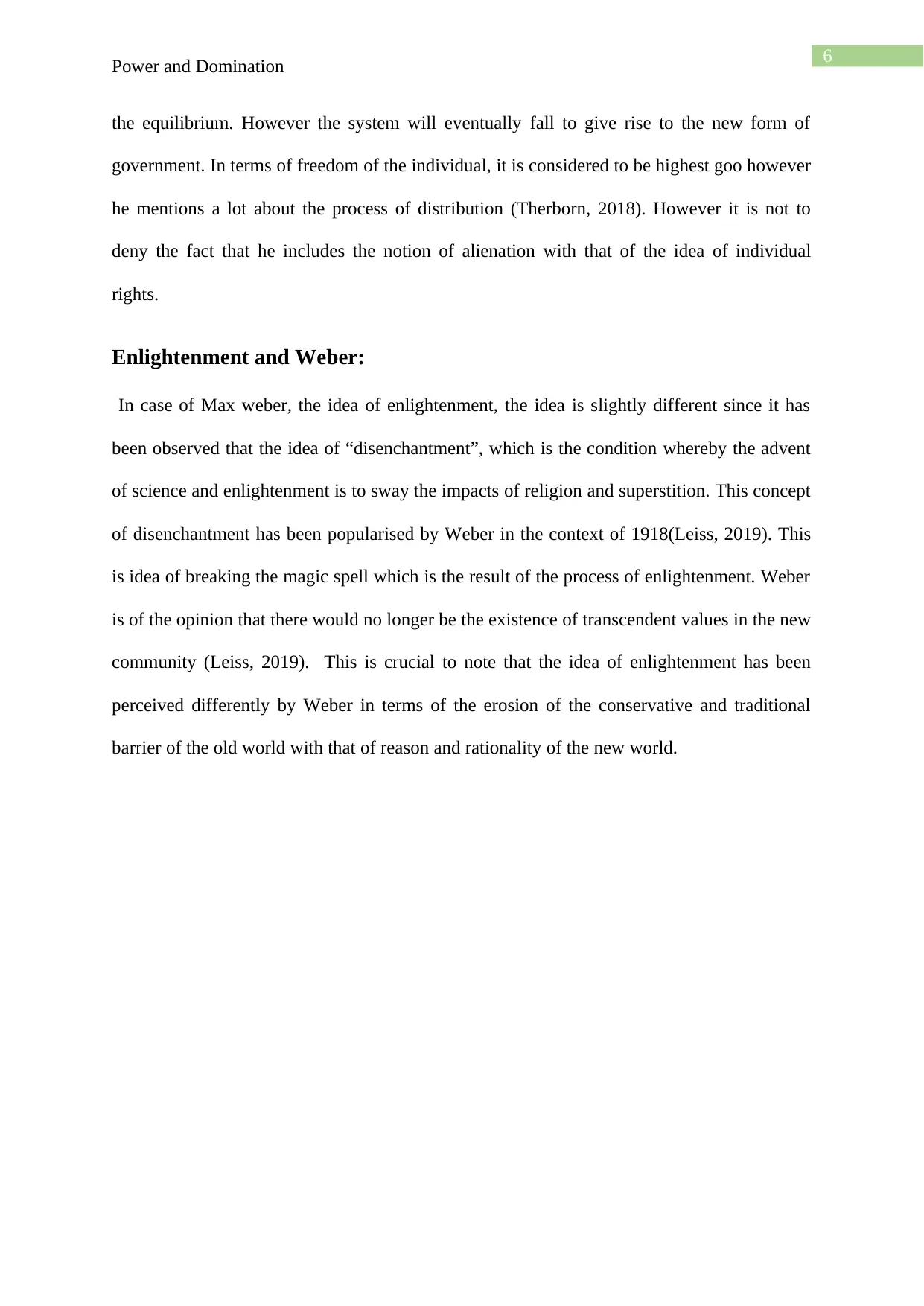
6
Power and Domination
the equilibrium. However the system will eventually fall to give rise to the new form of
government. In terms of freedom of the individual, it is considered to be highest goo however
he mentions a lot about the process of distribution (Therborn, 2018). However it is not to
deny the fact that he includes the notion of alienation with that of the idea of individual
rights.
Enlightenment and Weber:
In case of Max weber, the idea of enlightenment, the idea is slightly different since it has
been observed that the idea of “disenchantment”, which is the condition whereby the advent
of science and enlightenment is to sway the impacts of religion and superstition. This concept
of disenchantment has been popularised by Weber in the context of 1918(Leiss, 2019). This
is idea of breaking the magic spell which is the result of the process of enlightenment. Weber
is of the opinion that there would no longer be the existence of transcendent values in the new
community (Leiss, 2019). This is crucial to note that the idea of enlightenment has been
perceived differently by Weber in terms of the erosion of the conservative and traditional
barrier of the old world with that of reason and rationality of the new world.
Power and Domination
the equilibrium. However the system will eventually fall to give rise to the new form of
government. In terms of freedom of the individual, it is considered to be highest goo however
he mentions a lot about the process of distribution (Therborn, 2018). However it is not to
deny the fact that he includes the notion of alienation with that of the idea of individual
rights.
Enlightenment and Weber:
In case of Max weber, the idea of enlightenment, the idea is slightly different since it has
been observed that the idea of “disenchantment”, which is the condition whereby the advent
of science and enlightenment is to sway the impacts of religion and superstition. This concept
of disenchantment has been popularised by Weber in the context of 1918(Leiss, 2019). This
is idea of breaking the magic spell which is the result of the process of enlightenment. Weber
is of the opinion that there would no longer be the existence of transcendent values in the new
community (Leiss, 2019). This is crucial to note that the idea of enlightenment has been
perceived differently by Weber in terms of the erosion of the conservative and traditional
barrier of the old world with that of reason and rationality of the new world.
Paraphrase This Document
Need a fresh take? Get an instant paraphrase of this document with our AI Paraphraser
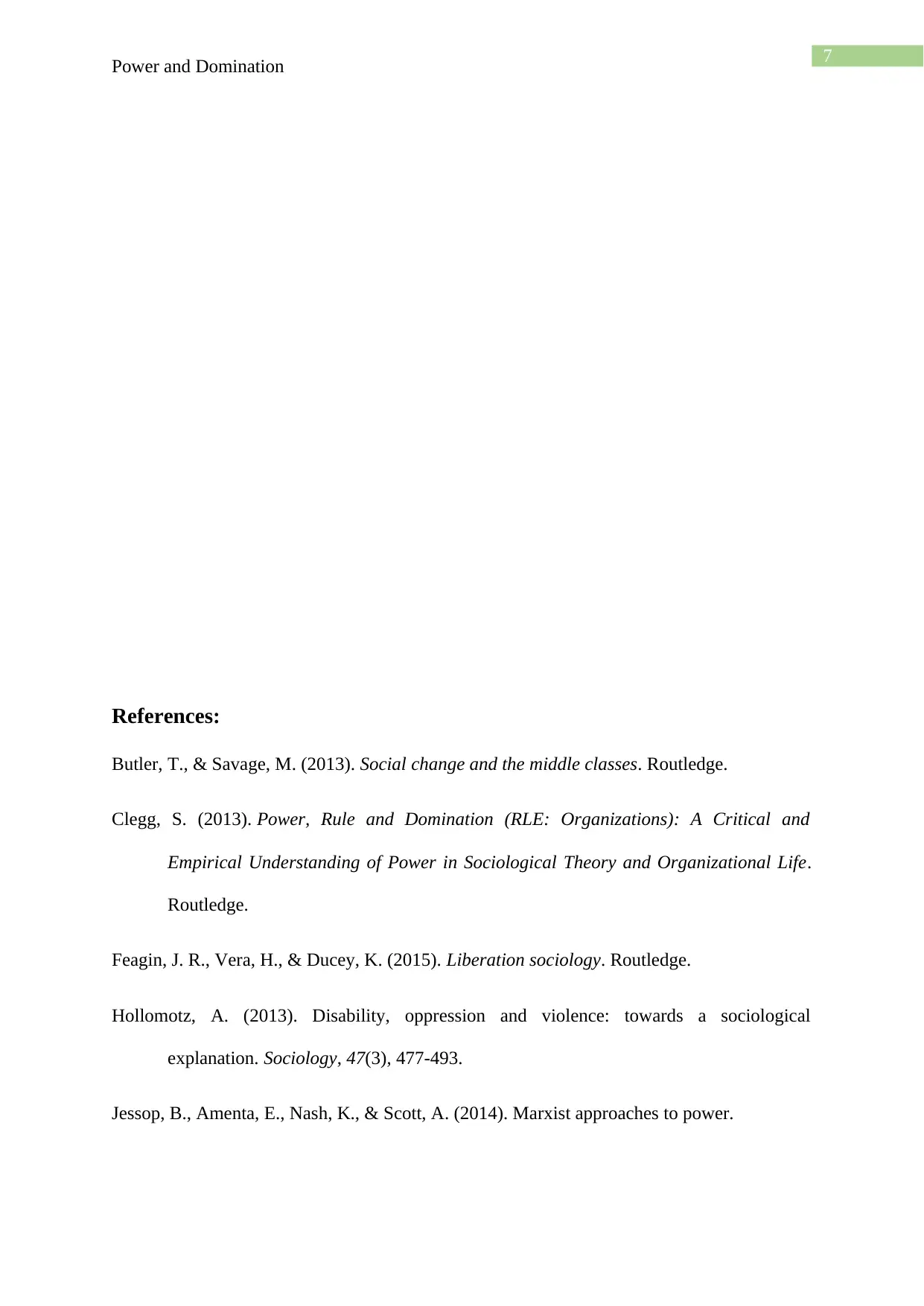
7
Power and Domination
References:
Butler, T., & Savage, M. (2013). Social change and the middle classes. Routledge.
Clegg, S. (2013). Power, Rule and Domination (RLE: Organizations): A Critical and
Empirical Understanding of Power in Sociological Theory and Organizational Life.
Routledge.
Feagin, J. R., Vera, H., & Ducey, K. (2015). Liberation sociology. Routledge.
Hollomotz, A. (2013). Disability, oppression and violence: towards a sociological
explanation. Sociology, 47(3), 477-493.
Jessop, B., Amenta, E., Nash, K., & Scott, A. (2014). Marxist approaches to power.
Power and Domination
References:
Butler, T., & Savage, M. (2013). Social change and the middle classes. Routledge.
Clegg, S. (2013). Power, Rule and Domination (RLE: Organizations): A Critical and
Empirical Understanding of Power in Sociological Theory and Organizational Life.
Routledge.
Feagin, J. R., Vera, H., & Ducey, K. (2015). Liberation sociology. Routledge.
Hollomotz, A. (2013). Disability, oppression and violence: towards a sociological
explanation. Sociology, 47(3), 477-493.
Jessop, B., Amenta, E., Nash, K., & Scott, A. (2014). Marxist approaches to power.
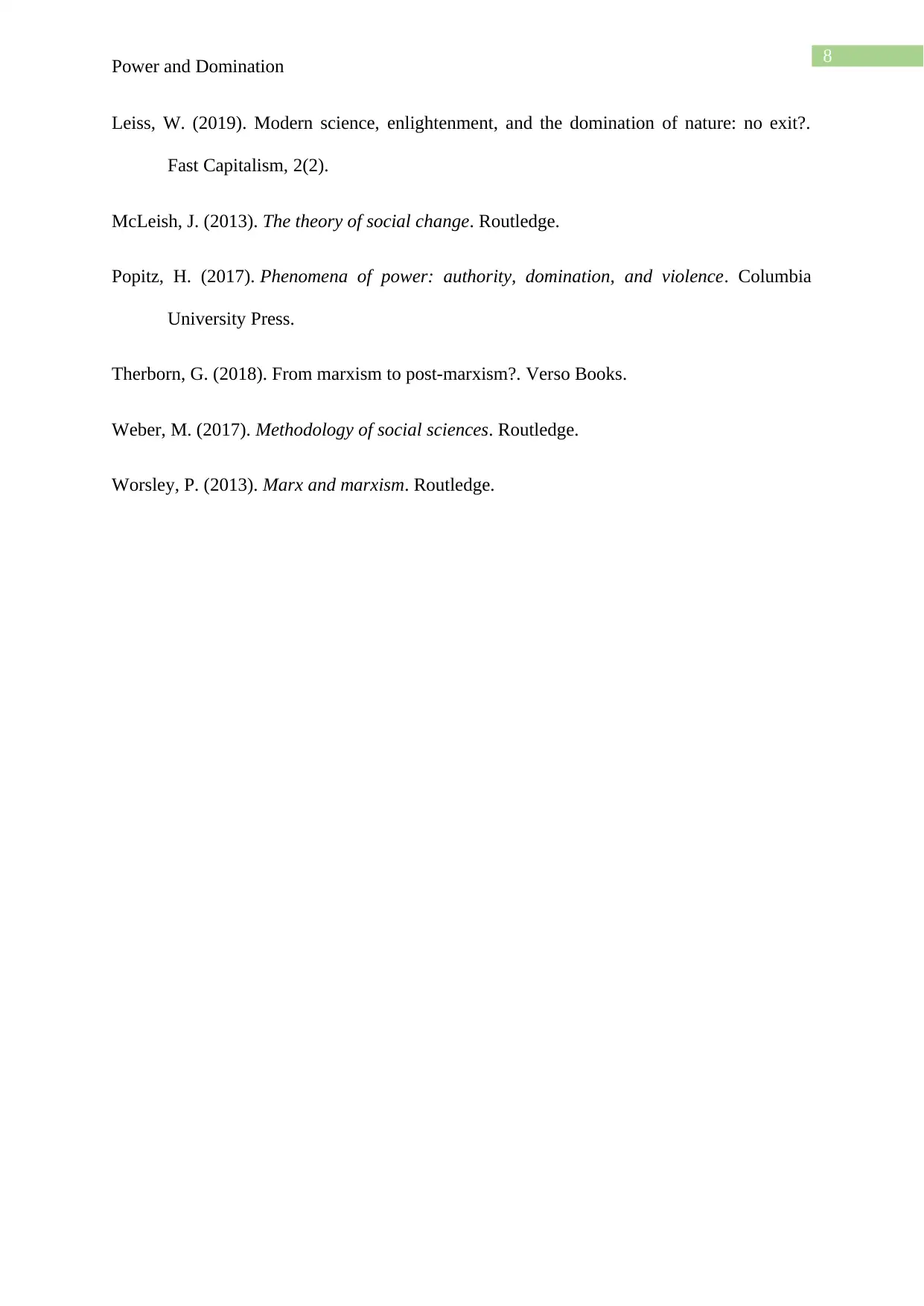
8
Power and Domination
Leiss, W. (2019). Modern science, enlightenment, and the domination of nature: no exit?.
Fast Capitalism, 2(2).
McLeish, J. (2013). The theory of social change. Routledge.
Popitz, H. (2017). Phenomena of power: authority, domination, and violence. Columbia
University Press.
Therborn, G. (2018). From marxism to post-marxism?. Verso Books.
Weber, M. (2017). Methodology of social sciences. Routledge.
Worsley, P. (2013). Marx and marxism. Routledge.
Power and Domination
Leiss, W. (2019). Modern science, enlightenment, and the domination of nature: no exit?.
Fast Capitalism, 2(2).
McLeish, J. (2013). The theory of social change. Routledge.
Popitz, H. (2017). Phenomena of power: authority, domination, and violence. Columbia
University Press.
Therborn, G. (2018). From marxism to post-marxism?. Verso Books.
Weber, M. (2017). Methodology of social sciences. Routledge.
Worsley, P. (2013). Marx and marxism. Routledge.
⊘ This is a preview!⊘
Do you want full access?
Subscribe today to unlock all pages.

Trusted by 1+ million students worldwide
1 out of 9
Related Documents
Your All-in-One AI-Powered Toolkit for Academic Success.
+13062052269
info@desklib.com
Available 24*7 on WhatsApp / Email
![[object Object]](/_next/static/media/star-bottom.7253800d.svg)
Unlock your academic potential
Copyright © 2020–2025 A2Z Services. All Rights Reserved. Developed and managed by ZUCOL.





